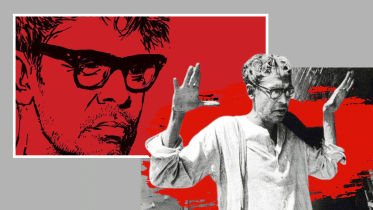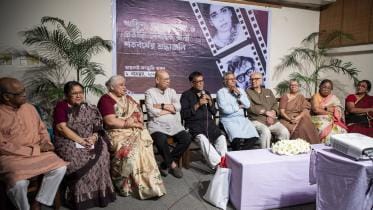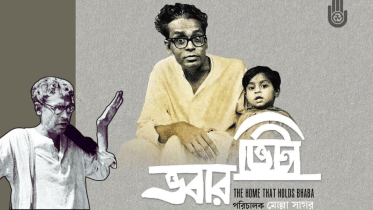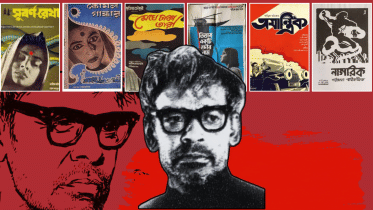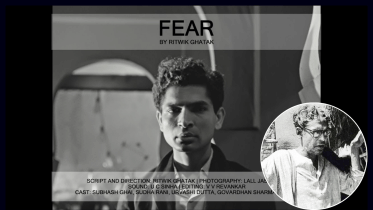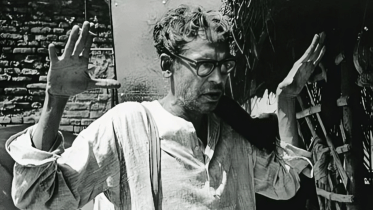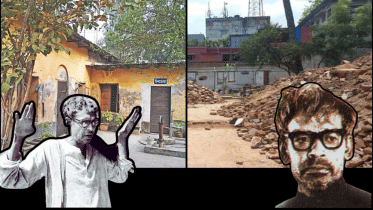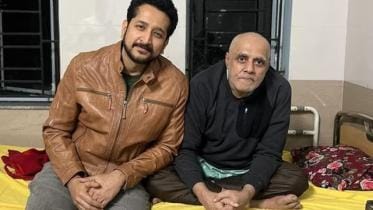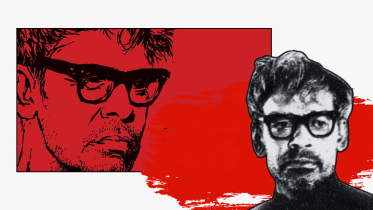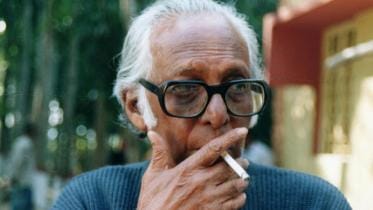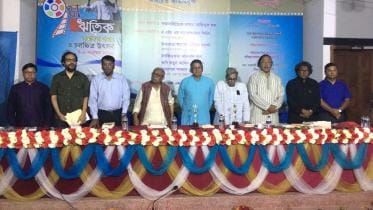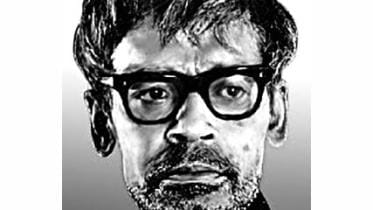Ritwik Ghatak
Ritwik Ghatak honoured with centenary showcase at Kolkata Int’l Film Festival
The exhibition, titled “Centenary Tribute Ritwik Ghatak: The Subaltern Voice”, opened on November 7 at the Nandan Foyer — KIFF’s main festival venue — and will continue until November 13.
9 November 2025, 07:07 AM
The Pain of Water
A lyrical meditation on Titash Ekti Nodir Naam, where Mallabarman and Ghatak intertwine rivers, memory, and Bengal’s fractured history.
4 November 2025, 09:51 AM
“Why should I leave?” The Partition in the cinema of Ritwik Ghatak
The agony over Partition-related uprootings from home and homeland suffuses Ghatak's cinema.
3 November 2025, 18:00 PM
Ritwik Ghatak at 100: Rajshahi home lies in ruins
Once a proud ancestral residence, the Rajshahi home of legendary filmmaker Ritwik Kumar Ghatak now stands in ruins—its walls weathered, rooms overrun by wild growth, and memories fading into dust. Tomorrow marks the 100th birth anniversary of this iconic filmmaker.
3 November 2025, 06:03 AM
Legends commemorate Ritwik Ghatak and Protiti Devi’s birth centenary
At Chhayanaut’s Ramesh Chandra Dutta Memorial Hall on Sunday, nostalgia met reverence as artists, activists, and admirers gathered to celebrate the birth centenary of filmmaker Ritwik Kumar Ghatak and his twin sister, singer Protiti Devi.
3 November 2025, 04:54 AM
Counter Foto exhibits Molla Sagar’s documentary film on Ritwik Ghatak
Ritwik Kumar Ghatak’s home in Rajshahi, was demolished by the locals post-July on 5 and August, 2024 by the locals in what seemed like a communal rift. The Rajshahi cultural society had petitioned as far back as 2017 to preserve it as a heritage site, but their appeals went unheard. The situation is tragic but it opens the door to important conversations about the necessity of preservation of culture and art.
11 October 2025, 14:27 PM
‘Bhabar Bhita’ to premiere in Dhaka, marking Ritwik Ghatak’s birth centenary
The documentary follows Sagar’s journey to Old Dhaka in search of the ancestral home where Ritwik and his twin sister were born and spent their childhood.
26 September 2025, 06:11 AM
Ghatak’s classics to headline Bengali film showcase at Indian Film Festival of Melbourne
This 16th edition of IFFM will be held from August 14 to 24, with a centenary tribute to the legendary Ritwik Ghatak headlining its programming. Ghatak’s evocative portrayals of partition, displacement and identity redefined the language of Indian filmmaking.
31 July 2025, 06:27 AM
FTII restores and releases Ritwik Ghatak’s film ‘Fear’ in 4K
“Fear” paints a chilling picture of existential dread: as news breaks of an imminent hydrogen bomb attack, a diverse group of people are rushed into an experimental shelter.
27 April 2025, 05:23 AM
Ritwik Ghatak’s film screening cancelled in Kolkata
The scheduled screenings of Ritwik Ghatak’s films, “Amar Lenin” and “Komal Gandhar”, at a government school in Kolkata were cancelled following objections from political leaders.
15 February 2025, 05:02 AM
New initiative to bring films to working-class communities
A new initiative, Mind the Gap Film Movement, has been launched to promote political awareness among working-class communities through cinema. With the theme “Political Films, Politics in Film,” the project aims to host a travelling film festival, bringing impactful and thought-provoking movies directly to the public.
30 November 2024, 06:55 AM
Ritwik Ghatak’s ancestral home demolished in Rajshahi
The ancestral home of legendary Bengali filmmaker Ritwik Kumar Ghatak in Rajshahi has been reduced to rubble, sparking outrage among local residents.
14 August 2024, 15:45 PM
Parambrata shares heartfelt encounter with uncle Ritaban Ghatak, son of Ritwik Ghatak
Renowned Bengali television and film actor, Parambrata Chattopadhyay, recently took to Instagram to share a touching encounter with his uncle, Ritaban Ghatak, the son of the esteemed filmmaker Ritwik Ghatak. In a heartfelt post, Chattopadhyay expressed his customary annual visits during significant festivals such as Durga Puja, Christmas, and New Year, sharing snapshots with his uncle.
27 December 2023, 11:12 AM
Ritwik Ghatak’s revolutionary film language
In terms of gauging the evolution of filmmaking since its inception, the year 1927 added a new dimension to the language of films. Attempts to express humane sentiments became a little easier and gradually films became a powerful tool for expressing said emotions. This optimal tool was used majestically in Bengali films by the proverbial Ritwik Ghatak.
4 November 2023, 12:23 PM
Mrinal Sen: a look back at excellence
Remembering the pioneer of Indian parallel cinema on his birth centenary
14 May 2023, 08:58 AM
Ritwik remembered in Rajshahi
A three-day long film festival began in Rajshahi on November 4, commemorating the 93rd birth anniversary of renowned auteur Ritwik Ghatak. This is the seventh instalment of the festival organised by Ritwik Ghatak Film Society, an association of film lovers dedicated to highlighting Ritwik Ghatak’s work.
4 November 2018, 18:00 PM
Remembering RITWIK on his birth anniversary
Ritwik Ghatak is better known as an auteur whose works signify the gloom and disorder associated with the partition of Bengal. His struggle was immense in his short-lived life of 50 years, and hardly received any recognition for his dedication towards the art of cinema. In his words, “I believe in committed cinema. I mean commitment in the broadest sense of the term.”
3 November 2018, 18:00 PM



